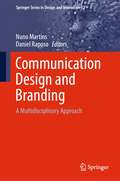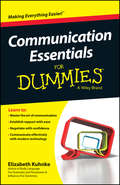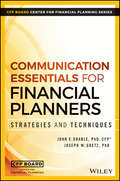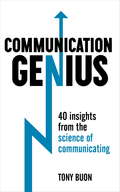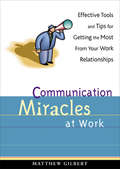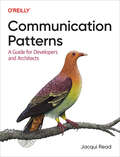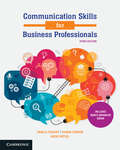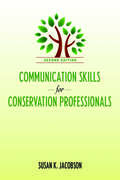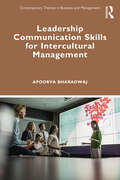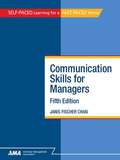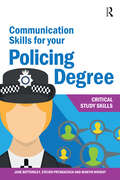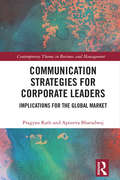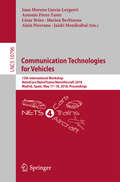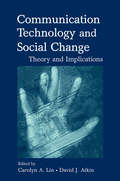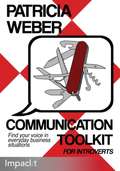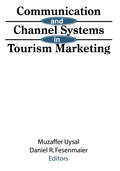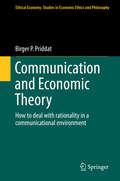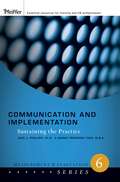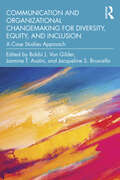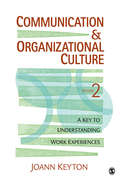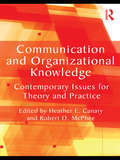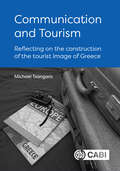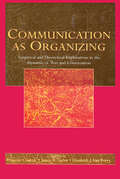- Table View
- List View
Communication Design and Branding: A Multidisciplinary Approach (Springer Series in Design and Innovation #32)
by Daniel Raposo Nuno MartinsThis book gathers new empirical findings fostering advances in the areas of communication design and branding, with a special emphasis of interdisciplinary approaches showing how to combine knowledge in those fields to improve businesses in a digital, global world. Gathering original, peer-reviewed contributions written by designers, computer scientists, marketer and product managers, this book provides both the communication and branding communities with a timely snapshot of current strategies and best-practices to improve different kinds of business through design. By highlighting current challenges, it is also intended to inspire and foster collaboration between different groups, in both university and industry.
Communication Essentials For Dummies
by Elizabeth KuhnkeGet ahead in your personal and professional life with crowd-pleasing communication skillsPacked with advice on improving verbal and non-verbal communication skills alike, Communication Essentials For Dummies is a comprehensive, approachable guide to communication no one should be without. Utilising a core range of simple skills, this friendly guide shows you how easy it is to communicate effectively. You'll find out how to listen actively, establish rapport, communicate with credibility, manage communication in difficult situations and converse with ease using modern technology -- and lots more.Great communication skills can make all the difference in your personal and professional life, but for those who tend to get a bit tongue-tied under pressure or just have a hard time asserting themselves, voicing thoughts coherently and confidently can be a sweat-inducing experience. Here, expert author Elizabeth Kuhnke takes the intimidation out of communication by sharing her top tips for successful communication in any situation.Discover how to get ahead in the workplace by mastering your communication skillsRealise the benefits of active listening and the value of establishing rapportUnderstand how the use of effective communication skills can help you secure a new job offerRecognise how to use effective communication to negotiate your way to personal and professional successWhether you're looking to climb the corporate ladder, take on a new professional challenge or just want to improve your communication skills in personal and professional relationships, Communication Essentials For Dummies will have you listening, voicing and articulating your way to success in no time.
Communication Essentials for Financial Planners: Strategies and Techniques
by John E. Grable Joseph W. GoetzCommunication Essentials for Financial Planners tackles the counseling side of practice to help financial planners build more productive client relationships. CFP Board’s third book and first in the Financial Planning Series, Communication Essentials will help you learn how to relate to clients on a more fundamental level, and go beyond "hearing" their words to really listen and ultimately respond to what they're saying. Expert coverage of body language, active listening, linguistic signals, and more, all based upon academic theory. There is also an accompanied set of videos that showcase both good and bad communication and counseling within a financial planning context. By merging written and experiential learning supplemented by practice assignments, this book provides an ideal resource for any client-facing financial professional as well as any student on their pathway to CFP® certification. Counseling is a central part of a financial planner's practice, and attention to interpersonal communication goes a long way toward progressing in the field; this guide provides practical instruction on the proven techniques that make a good financial planner great. The modern financial planning practice is more than just mathematics and statistical analysis—at its heart, it is based on trust, communication, and commitment. While interpersonal skills have always been a critical ingredient for success, only recently has this aspect been given the weight it deserves with its incorporation into the certification process. Communication Essentials for Financial Planners provides gold-standard guidance for certification and beyond.
Communication Genius: 40 Insights From the Science of Communicating
by Tony BuonThe fast-track MBA in communicationImagine having instant access to the world's smartest thinking on human communication - and being shown exactly what to do to guarantee that all of your communication is right, every time. Communication Genius makes it easy to apply the scientific facts that researchers know about communication to the real world. 40 chapters based on cutting-edge business and psychology research projects reveal what works and what doesn't work when we interact with each other. Each of the 40 chapters is a mini-masterclass in communicating better, explaining the research and showing you how to apply it for yourself to improve your own communication skills.Too often, conventional wisdom says one thing while research says another. Communication Genius cuts through the noise to bring you proven research and techniques for applying it that will simply make you a better all-round communicator.With chapters on body language, emotional intelligence, neuro-linguistic programming (NLP), presentations, mimicry, groupthink and the latest neuroscience, Communication Genius explodes some myths and gives you the best that science has to offer on communication. Quick to read and intensely practical, this book will bring a little communication genius into your day.'A must read if you want to communicate better' Professor Sir Cary Cooper, Manchester Business School, University of Manchester'Required reading for anyone seeking to better their communication skills in the workplace and otherwise' Dr Anastasia P. Rush, Clinical Psychologist, CEO HELLAS EAP (Greece)'Calls into question accepted 'beliefs' (Maslow's hierarchy) and introduces the reader to an array of new theories from "IQ" racism to the Obama effect' Kate Nowlan, Chief Executive, CiC Employee Assistance, Fellow Royal Society of Arts (FRSA)'Tony has done a fantastic job in pulling together an amazing number of articles and scientific studies and making them understandable to the lay person' Andrew Kinder, Chartered Counselling & Chartered Occupational Psychologist, Employee Assistance Professionals Association (EAPA -UK) Chair
Communication Genius: 40 Insights From the Science of Communicating
by Tony BuonThe fast-track MBA in communicationImagine having instant access to the world's smartest thinking on human communication - and being shown exactly what to do to guarantee that all of your communication is right, every time. Communication Genius makes it easy to apply the scientific facts that researchers know about communication to the real world. 40 chapters based on cutting-edge business and psychology research projects reveal what works and what doesn't work when we interact with each other. Each of the 40 chapters is a mini-masterclass in communicating better, explaining the research and showing you how to apply it for yourself to improve your own communication skills.Too often, conventional wisdom says one thing while research says another. Communication Genius cuts through the noise to bring you proven research and techniques for applying it that will simply make you a better all-round communicator.With chapters on body language, emotional intelligence, neuro-linguistic programming (NLP), presentations, mimicry, groupthink and the latest neuroscience, Communication Genius explodes some myths and gives you the best that science has to offer on communication. Quick to read and intensely practical, this book will bring a little communication genius into your day.'A must read if you want to communicate better' Professor Sir Cary Cooper, Manchester Business School, University of Manchester'Required reading for anyone seeking to better their communication skills in the workplace and otherwise' Dr Anastasia P. Rush, Clinical Psychologist, CEO HELLAS EAP (Greece)'Calls into question accepted 'beliefs' (Maslow's hierarchy) and introduces the reader to an array of new theories from "IQ" racism to the Obama effect' Kate Nowlan, Chief Executive, CiC Employee Assistance, Fellow Royal Society of Arts (FRSA)'Tony has done a fantastic job in pulling together an amazing number of articles and scientific studies and making them understandable to the lay person' Andrew Kinder, Chartered Counselling & Chartered Occupational Psychologist, Employee Assistance Professionals Association (EAPA -UK) Chair
Communication Miracles at Work: Effective Tools and Tips for Getting the Most From Your Work Relationships
by Matthew GilbertCommunication Miracles at Work is about experiencing breakthrough moments of connectedness and understanding with co-workers, managers, staff members, and clients. Developed out of Matthew Gilbert's experience as an employee, communication consultant, manager, and facilitator, Communication Miracles at Work will help readers develop effective communication and relationship-building skills for achieving workplace harmony. Topics include the "corporate culture" and how it enhances or hinders the ability of people to get along, the role of stress in ineffective communication, issues of gender in talking and listening, and how to use good communication in everyday situations. Readers are carefully guided toward seeing their own personal obstacles around communicating and are given effective tools on how to make almost any workplace encounter an opportunity for personal and spiritual growth. This book is for anyone who wants to have a better day-to-day experience at work, reaching out to people wherever they are on the corporate ladder, from those just entering the workforce to more experienced workers to managers and CEOs.
Communication Patterns: A Guide for Developers and Architects
by Jacqui ReadHaving a great idea or design is not enough to make your software project succeed. If you want stakeholders to buy into your design and teams to collaborate and contribute to the vision, you also need to communicate effectively. In this practical book, author Jacqui Read shows you how to successfully present your architecture and get stakeholders to jump on board.Misunderstanding and lack of buy-in leads to increasing costs, unmet requirements, and an architecture that is not what you intended. Through constructive examples and patterns, this book shows you how to create documentation and diagrams that actually get the message across to the different audiences you'll face.This book shows you how to:Design diagrams and documentation appropriate to your expected audience, intended message, and project stageCreate documentation and diagrams that are accessible to those with varying roles, needs, or disabilitiesMaster written, verbal, and nonverbal communication to succeed in technical settingsApply the communication patterns presented in this book in real-world projects and software designsCommunicate and collaborate with distributed teams to successfully design and document software and technical projects
Communication Skills for Business Professionals
by Angela Feekery Shawn Michael Condon Mieke WitselEffective communication is an essential skill all students need to succeed professionally. Based in theory and informed by practice, Communication Skills for Business Professionals takes readers through a range of basic communication concepts and demonstrates how they can be applied in business settings. The third edition has been restructured into three parts, respectively covering understanding communication, communicating in organisations and professional communication strategies in practice. The text has been updated to examine contemporary topics of increasing relevance, including the effects of AI on communication skills, intercultural competencies in business contexts and how to successfully facilitate virtual meetings in a post‒COVID-19 workplace. Each chapter includes short-answer questions, skill-builder activities and margin definitions to cement learning, while the two running case studies provide realistic examples of communication in practice. Communication Skills for Business Professionals remains an indispensable resource for business students wanting to improve their communication skills.
Communication Skills for Business Professionals
by Michael Lewis Phillip Cenere Robert Gill Celeste Lawson Phillip Cenere Robert Gill Celeste LawsonCommunication Skills for Business Professionals is a student-friendly introduction to the principles and practice of effective communication in the workplace. Engagingly written and full of real-life examples, it explains the key theories underpinning communication strategies and encourages students to consider how to apply them in a contemporary business environment. After working through foundation topics such as understanding the audience, persuasion and influence, negotiation and conflict management, and intercultural complexities, students will explore the various modes and contexts of workplace communication including meetings, oral communication, written reports and correspondence. The text incorporates discussion of new digital technologies such as virtual real-time communication, and dedicates an entire chapter to the specific considerations involved in writing for the web. With its emphasis on Australian contexts and examples, Communication Skills for Business Professionals is an excellent introduction to the world of professional communication.
Communication Skills for Conservation Professionals
by Susan Kay JacobsonWhether you are managing wetlands, protecting endangered species, or restoring ecosystems, you need to be able to communicate effectively in order to solve conservation and resource management problems. Communication Skills for Conservation Professionals can help you do just that--it is a practical and inspiring book that provides user-friendly guidance on achieving conservation goals through effective communication. Following introductory chapters that draw on research from communication, psychology, sociology, and education to highlight elements critical for effective communication, the book describes how to gather background information and target audiences, explains how public relations can influence attitudes and behaviors, and outlines how to design and conduct a communications campaign. In addition, it provides step-by-step guidance for using print, broadcast, and electronic mass media; demonstrates methods for developing public talks, interpretive brochures, exhibits, and trails; and explores long-term conservation education strategies for students and adults. This second edition of a widely praised book, originally published in 1999, includes new material on working with stakeholders, volunteers, and other groups to multiply conservation success. It also expands on the use of electronic media with examples of conservation Web pages, blogs, e-newsletters, and other new media. The book's citations have been updated to include a host of Web sites and other electronic sources useful for planning and implementing communication programs. Communication Skills for Conservation Professionals is a valuable addition to the conservationist's toolbox that will help scientists, managers, concerned citizens, and students communicate more effectively.
Communication Skills for Global Leadership: Strategies for Effective Intercultural Management (Contemporary Themes in Business and Management)
by Apoorva BharadwajIntercultural business communication has assumed enormous significance in recent times for corporate leaders for transmitting and disseminating ideas across borders and for achieving organisational goals. This book provides a comprehensive introduction to communication strategies in business with a focus on diversity management skills.Culturally congruent communication competencies play an essential role in fostering productive conversations in transnational markets. This book includes in-depth research that explores key communication skills like negotiations, leadership, persuasion, argumentation, and corporate etiquette for professionals working in multinational realms of international commerce. It discusses intercultural management theories, non-verbal communications, and effective methods of communicating in virtual environments. The book also highlights the role and importance of diversity management in steering and helming multicultural teams and the expertise needed to manage stressful and challenging communication scenarios in variegated geo-cultural workspaces.Part of the Contemporary Themes in Business and Management series, this book will be useful for scholars and researchers of management studies, business communications, communication studies, business economics, business ethics, and digital communication, as well as for corporate professionals working with multinationals.
Communication Skills for Managers, Fifth Edition
by Janis Fischer ChanCommunicating clearly is a critical skill for successful managers! The ability to communicate clearly is the critical core competency for successful managers at all levels and in all industries. This book is your guide to business communication that delivers the message—whether written, or spoken, in person or via e-mail—with respect for the receiver, and in all business situations. This solid overview of all facets of business communication offers numerous opportunities to practice and apply your new skills and a log to track your improvement. Readers will learn how to: • Communicate clearly and correctly to avoid misunderstanding and get your message across • Develop and use your listening skills to solve problems, diffuse conflict, teach staff, and be a more productive manager or team leader • Ask the right type of question to elicit information, encourage a response, or create a relationship • Master the techniques of successful presentations from planning to delivery • Analyze your audience before communicating your ideas in any format • Choose the most appropriate mode for communicating your message • Use effective language to express your ideas clearly in well-constructed letters, proposals, memos, and e-mail
Communication Skills for your Policing Degree (Critical Study Skills)
by Martin Wright Jane Bottomley Steven PryjmachukIf you are embarking on a university criminology, policing or other law enforcement professional degree, the books in this series will help you acquire and develop the knowledge, skills and strategies you need to achieve your goals. They provide support in all areas important for university study, including institutional and disciplinary policy and practice, self-management, and research and communication. Tasks and activities are designed to foster aspects of learning which are valued in higher education, including learner autonomy and critical thinking, and to guide you towards reflective practice in your study and work life.Communication Skills for your Policing Degree provides you with a sound knowledge and understanding of: how to improve your oral and written communication skills in a range of academic and professional settings a range of strategies for improving your public speaking, including academic presentations a range of techniques for improving your practical writing and speaking skills.
Communication Strategies for Corporate Leaders: Implications for the Global Market (Contemporary Themes in Business and Management)
by Pragyan Rath Apoorva BharadwajCommunication is key to success in every aspect of life and ever so in a competitive business environment. This book examines managerial communication from seminal theoretical and demonstrative vantage points through interdisciplinary amalgamation of sciences and the liberal arts. It presents new paradigms of managerial communication in the form of manoeuvres that can act as game changers in tug-of-war business situations, including difficult negotiations, conflicts and interpersonal dissonance that characterise the day-to-day corporate workplace tenor. This volume: Develops persuasion strategies based on argumentation tactics derived, for example, from legal cross-examination. Introduces ‘problematisation’ and ‘deconstruction’ as effective communication tools into mainstream managerial discourse. Employs Harvard Business School cases to demonstrate problem-solving skills, which will further serve as guide to writing business reports, plans and proposals. Positions business writing methods as taxonomical tenets that can help tackle complex business scenarios. Draws business diagnostic procedures from diverse fields such as Sherlock Holmes from popular culture, and Jared M. Diamond from ecology. This book will be a significant resource for business communication practitioners, especially corporate managers and leaders, sales and marketing professionals, and policymakers. It will be of interest to teachers and students alike, in business communication, organization behaviour, human resource management and marketing communications. It will act as a useful aid for classroom efficacy for teachers and academics.
Communication Technologies for Vehicles: 13th International Workshop, Nets4Cars/Nets4Trains/Nets4Aircraft 2018, Madrid, Spain, May 17-18, 2018, Proceedings (Lecture Notes in Computer Science #10796)
by Alain Pirovano Marion Berbineau Juan Moreno García-Loygorri Antonio Pérez-Yuste César Briso Jaizki MendizábalThis book constitutes the proceedings of the 13th International Workshop on Communication Technologies for Vehicles, Nets4Cars/Nets4Trains/Nets4Aircraft 2018, held in Madrid, Spain, in May 2018.The 17 full papers presented together with 2 demo papers in this volume were carefully reviewed and selected from numerous submissions.The volume features contributions in the theory or practice of intelligent transportation systems (ITS) and communication technologies for:- Vehicles on road: e.g. cars, tracks and buses;- Air: e.g. aircraft and unmanned aerial vehicles; and - Rail: e.g. trains, metros and trams.
Communication Technology and Social Change: Theory and Implications (Routledge Communication Series)
by Carolyn A. Lin David J. AtkinCommunication Technology and Social Change is a distinctive collection that provides current theoretical, empirical, and legal analyses for a broader understanding of the dynamic influences of communication technology on social change. With a distinguished panel of contributors, the volume presents a systematic discussion of the role communication technology plays in shaping social, political, and economic influences in society within specific domains and settings. Its integrated focus expands and complements the scope of existing literature on this subject. Each chapter is organized around a specific structure, covering:*Background—offering an introduction of relevant communication technology that outlines its technical capabilities, diffusion, and uses; *Theory—featuring a discussion of relevant theories used to study the social impacts of the communication technology in question; *Empirical Findings—providing an analysis of recent academic and relevant practical work that explains the impact of the communication technology on social change; and*Social Change Implications—proposing a summary of the real world implications for social change that stems from synthesizing the relevant theories and empirical findings presented throughout the book. Communication Technology and Social Change will serve scholars, researchers, upper-division undergraduate students, and graduate students examining the relationship between communication and technology and its implications for society.
Communication Toolkit for Introverts
by Patricia WeberAbout This Book Discover your voice in order to effectively influence those around you Get ahead in the business world by building up your toolkit of communication skills Develop meaningful relationships and leverage them through effective communication Explore the secrets of effective listening, essential for successful business relationships Who This Book Is For If you identify as introvert and are ambitious and determined to succeed in business but you are finding it difficult to find your voice, this easy-to-use and friendly book is for you. In Detail If you are an introvert, tired of playing by extrovert rules in business communications, now you can finally find your voice and be heard. Patricia Weber is an internationally recognized expert on radio and in print as supporting and inspiring introverts, since 2006. She is a Coachville coach graduate, a Neuro-Linguistic Programming (NLP) Practitioner, an award winning top-selling salesperson and sales manager, and a two-time award winner of Peninsula Women's Networker of the Year (only the second member in its 30 years to receive this award twice). Learn how to successfully get your ideas heard in business by employing the Introvert's Toolkit. Discover what natural strengths you have and how you can enhance them through real-world scenarios and techniques to get yourself using business communication effectively. Starting with a personal assessment, every chapter builds up your confidence when communicating by employing a mix of tips and techniques, creating inspired actions plans, and expanding on the strengths and skills you already possess. We cover a variety of areas from essential communication skills through to developing negotiation skills and conflict management – everything you need to succeed in any business setting. This guide will provide any motivated introvert with the necessary tools to build extensive communication skills and forge ahead and fulfil their potential in what many label as a more extroverted business world.
Communication and Channel Systems in Tourism Marketing
by Daniel Fesenmaier Muzaffer UysalWhat sources of information do tourists consult when choosing a travel destination? How can communication channels be used to reach the tourist market for a specific region? This resource provides new insight into these important questions and more on developing tourism marketing strategies using the key factors of communication and channel systems. Communication and Channel Systems in Tourism Marketing features both conceptual and applied research which provides an excellent base for tourism marketers and destination planners to evaluate and improve their overall tourism marketing programs. Tourism and hospitality scholars discuss communication distribution channels, media selection, information needs and sources, importance of travel brochures and slogans, brochure design, and the effectiveness of communication messages in tourism marketing. The advantages and disadvantages of a wide variety of communication channels are explored including word-of-mouth, brochures/pamphlets, travel agents, magazines, radio, television, and slogans. Some of the topics covered in this book that demonstrate the use of communication and channel systems in tourism marketing are: building repeat visitor relationships image formation distribution channels communication messages and their effectiveness design of destination- and attraction-specific brochures communicating unique selling propositions in slogans This groundbreaking book presents original, empirical research that incorporates communications and channels systems as integral components of tourism marketing. The diversity and originality of these tourism research cases will be helpful to destination promoters, tourism decisionmakers, and tourism planners worldwide. Communication and Channel Systems in Tourism Marketing is also a valuable supplementary text for students in courses on leisure, recreation, hospitality, tourism, and marketing.
Communication and Economic Theory: How to deal with rationality in a communicational environment (Ethical Economy #47)
by Birger P. PriddatThis book analyzes the different topics which highlight the relevance of communication within markets. In using and reformulating concepts of Arrow, Commons, Williamson, North, Becker and others, the author shows the hidden implications of these authors for a new approach in economics: communication matters. Markets are systems of allocation, which are governed by communication networks. In Economics, so far, communication processes play a minor role. During the last century, there was a tendency of using 'communication' as a tool for reintroducing the diversity of rational actions. Yet, communication is a governance-structure of its own, which cannot be used as a tool, since communication is disturbing the expectations of the economics actors and changing the actor's preferences as well as their belief-systems. By using examples such as Kenneth Arrow's economics actor theory and Douglas North's emphasis on communication being a process of building 'shared mental models', this book argues that if communication matters, we have to reinterpret the basics of economic methodology and integrate network-processing and discourse theories.
Communication and Implementation: Sustaining the Practice (Measurement and Evaluation Series #6)
by Jack J. Phillips Wendi Friedman TushCommunication and Implementation is the sixth of six books in the Measurement and Evaluation Series from Pfeiffer. The proven ROI Methodology--developed by the ROI Institute--provides a practical system for evaluation planning, data collection, data analysis, and reporting. All six books in the series offer the latest tools, most current research, and practical advice for measuring ROI in a variety of settings. Communication and Implementation explores two important topics that are vital to the ROI Methodology--reporting results and sustaining the process. The authors show how to report results that will ensure that the audience has the information needed so that the improvement processes will be implemented successfully. The book explores the range of reporting methods, including face-to-face meetings, brief reports, one-page summaries, routine communication, mass-audience techniques, and electronic communications. The authors offer suggestions for determining the best methods to employ. In addition, Communication and Implementation contains information on how to keep the ROI process going for the long haul and how to make it a valued process for any organization.
Communication and Organizational Changemaking for Diversity, Equity, and Inclusion: A Case Studies Approach
by Van Gilder, Bobbi J. Jasmine T. Austin Jacqueline S. BruscellaThis book explores the opportunities, challenges, and effective approaches to organizational change regarding diversity, equity, inclusion, and belonging. Featuring application-based case studies and practical guidelines for meaningful organizational change, this book problematizes some of the current DEI initiatives in today’s organizations. It examines multiple forms of diversity (e.g., race, age, and mental health) from a variety of perspectives (e.g., leadership and employee), with case studies that demonstrate how changemaking efforts can be reimagined and implemented in better, more nuanced, and more sustainable ways to produce meaningful organizational change. Through these case studies, readers learn from organizations’ successes and failures in their attempts to implement DEI practices. Each chapter concludes with explicit practical implications and/or actionable recommendations for organizational changemaking. This text will make an impactful addition to courses in communication and diversity or organizational communication/change at the advanced undergraduate or graduate level, and will be an essential guide for professionals wishing to lead change in their organizations.
Communication and Organizational Culture: A Key to Understanding Work Experiences
by Joann N. KeytonThis book provides a clear and concise introduction to the different approaches to studying organizational culture. Joann Keyton introduces the basic elements—assumptions, values, and artifacts—of organizational culture, draws on communication and management research findings, and integrates practical applications throughout the text. The book helps students to identify and read organizational culture through different lenses, create cultural interpretations, and ultimately make informed work and employment decisions.
Communication and Organizational Knowledge: Contemporary Issues for Theory and Practice (Routledge Communication Series)
by Heather E. CanaryThis book provides an overview of communication-centered theory and research regarding organizational knowledge and learning. It brings the work of scholars in communication, management, information technology, and other disciplines together in a coherent volume that represents existing research and theory on communication-related knowledge work. Chapters address what constitutes knowledge, how knowledge functions within and across organizations, and how organizational members develop and manage knowledge for organizational purposes. The book also provides a forum for these scholars to pose directions for future research and theorizing. It will serve as a reference tool for scholars and practitioners to identify and understand communicative features of organizational knowledge processes.
Communication and Tourism: Reflecting on the construction of the tourist image of Greece
by Dr Michael TsangarisThe nexus of human mobility and communication is intricate, and this volume uncovers the deep-rooted significance of tourism and media . From antiquity to modern day, Western communication systems have artfully crafted the allure of destinations, making places irresistible to the travellers. At its core, this book proposes that the impetus for travel is a primal human necessity, rooted in our inherent need for movement, consciousness expansion, and cultural development. Featuring Greek civilization as a case study, the book reveals how the rich cultural capital of modern Greece, long admired and assimilated by many global cultures, has immensely contributed to Greece's contemporary tourism "imaginary". Readers are challenged to look beyond prevailing practices where tourism management and marketing are the driving force for commercial exchange, but to encompass its broader essence as a vital human function, leading to richer experiences. Drawing on theory from communication studies, social psychology, social anthropology, cultural and tourism studies the book is: · an historical panorama, exploring how communication has continually influenced the allure of tourist destinations · an overview of philosophical essence of tourism as a basic human need intertwined with consciousness expansion. · written in an engaging style to stimulate thought in current issues around the tourism industry It will be of interest to academics within areas related to tourism studies, mobility studies, mass media, communication and cultural studies.
Communication as Organizing: Empirical and Theoretical Explorations in the Dynamic of Text and Conversation (Routledge Communication Series)
by James R. Taylor Elizabeth J. Van Every François CoorenCommunication as Organizing unites multiple reflections on the role of language under a single rubric: the organizing role of communication. Stemming from Jim Taylor's earlier work, The Emergent Organization: Communication as Its Site and Surface (LEA, 2000), the volume editors present a communicational answer to the question, "what is an organization?" through contributions from an international set of scholars and researchers. The chapter authors synthesize various lines of research on constituting organizations through communication, describing their explorations of the relation between language, human practice, and the constitution of organizational forms. Each chapter develops a dimension of the central theme, showing how such concepts as agency, identity, sensemaking, narrative and account may be put to work in discursive analysis to develop effective research into organizing processes. The contributions employ concrete examples to show how the theoretical concepts can be employed to develop effective research. This distinctive volume encourages readers to discover and develop a truly communicational means of addressing the question of organization, addressing how organization itself emerges in the course of communicational transactions. In presenting a single and entirely communicational perspective for exploring organizational phenomena, grounded in the discourse of communicational transactions and the establishment of relationships through language, it is required reading for scholars, researchers, and graduate students working in organizational communication, management, social psychology, pragmatics of language, and organizational studies.
